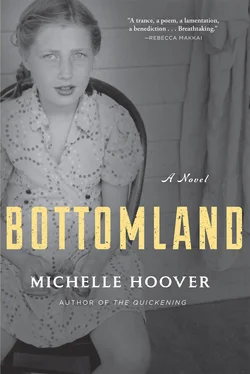Morning in Chicago. At the telegraph office, I wrote home. no luck. coming back. I was dizzy with walking, my feet pins. I had one more house to check. I didn’t have much hope in that. As I headed out, the man in the office called my name. “You Lee Hess?”
“Yes, sir. Yes.”
He looked at me under heavy lids. He was holding the order I’d just filled, my name at the top in caps. The man was gray as a squirrel skin, too old for his face to show much feeling. “This young woman here says we have a message for you. Been waiting here a week, she says.”
The man ambled his way to the back. The woman took his place, picking at her fingers. Those nails of hers, they were painted a bloody kind of red. “He’s getting it,” she said with a squint. “I remembered your name.”
I took off my hat.
“Lee Hess, I remembered it,” she went on. “That’s why I knew you had a message waiting.”
“I should thank you.”
“Don’t thank me, a name like that.”
The old man returned. “Don’t worry about her,” he whispered. “She lost a brother over there.” He handed me a piece of paper. I was quick to fold it in half.
“Aren’t you going to read it?” the man asked.
“I’ll read it, sure.” I made for the door. The cold outside was roaring bright, same as in my head.
“It’s XU,” he shouted after me. “That means they want an answer .”
But I didn’t have an answer for them. Not yet.
I knocked at the last boardinghouse. This one seemed different. Off on its own in the old town. The alley was a long block of bricks, not a window or door except one. A dog limped by the wooden steps, sniffing my leg. When I lowered my fingers to him, he bared his teeth. I knocked again. That telegram burned in my pocket. The girls might have come back, that’s what it said. If so, I should be some happy. But back felt like I’d wasted it. My alley nights, they were good for nothing much. Back meant I still hadn’t done anything right.
The door opened like a shot. The woman clapped a hand to her chest. “Young man, you startled me.”
“Sorry, ma’am.”
“What are you doing here?”
The woman was tall as a German and thick about the middle, a wisp of gray hair on her head. But that voice of hers, it was like Squire’s. Irish.
“Are you crazy or something?” the woman asked. “You are, aren’t you? A crazy man.” She went to close the door. “I house girls here. Not men. And I don’t have anything else you’re looking for either.”
I moved quick, took the poster from my pack. “I’m looking for my sisters.” I unrolled the poster, trying to hold it straight. The woman studied their faces, pinching the poster between her fingers. Those hands of hers were small, square as a child’s. “I don’t want any trouble.”
“I don’t mean trouble.”
She threw a look at the stairwell. “They’re not here.”
“Are you sure?”
“You think I don’t know my own house?”
I checked the number on the door. “But this is the last one. I’ve tried all the others.”
“Then you’re out of luck.”
She went to shut the door again, but I stuck in my foot. Those pins went deeper yet. “Ma’am.”
“Young man, please remove your foot or I’ll call the authorities.”
“Their names are Esther and Myrle. Esther’s younger than me by five years, Myrle’s two under that. You can see them on the poster.”
The woman sighed. “I don’t need posters.”
I leaned my shoulder against the door. My head was fevered. The snap of the dog and the smell of oil, a terrible roar at the alley’s end. A whistle then, but far off, as if calling the dog to come.
“What’s wrong with you? You look like you’re about to faint.”
“Sorry, ma’am.” The poster slipped from my fingers, but I caught it fast.
“You can’t even hold a piece of paper. You won’t make it off this step.”
“This is the last place.”
She let out a sigh. “Come in, but stay to the parlor. I’ll get you a glass of water. Then you’ll have to move along.”
She went off down the hall to the kitchen. Inside the parlor, I stood with my hat pressed to my chest, my heart going. There was whispering behind the kitchen door. When the woman came out, she left that door behind her swinging, but I couldn’t see inside.
“You can rest your feet.” Her hand made a show of the parlor sofa. “But be quick about it.”
I perched on the edge of a cushion. The sofa was white with daisies. The arms had tassels at the end. I felt white and hot, though the glass of water was cool in my fingers.
“You’re not drinking very fast.” The woman lowered herself into the other chair.
“Sorry, ma’am, I just. ”
“You’ve already said what you’re doing. But why do you think your sisters are here?”
“They left our farm more than a month ago.”
“And you haven’t heard anything.”
I thought of the telegram but shook my head.
She sighed. “Sit back, why don’t you? I can’t have a man big as you faint in here. I don’t know the first thing I’d do then.”
“That’s all right, ma’am. I’ll be good to go.”
“Some girls just need to be left alone.”
I held my water and took a long drink.
“Girls like the picture you showed me,” she went on. “It’s no use trying to get them to do anything. Not at that age. That’s something I know.”
I took another drink. The room was worn but bright. Books on a row of shelves, a coffee table spotted with fingerprints. The woman eyed those prints and wet her thumb to clean them. When the factories let out, the place must have filled to the brim. A long coatrack hung in the hall, the rungs empty, but still the smell of girls, a fresh wash. And with the white sofa under me, the place was some comfortable. Above the fireplace, a frilly line of text in a frame:
To be sympathetic without being sentimental.
To care for the tired and sick.
To be patient with the hysterical.
To direct youthful gayety and extravagance.
To help girls in danger of losing the heritage
of womanhood.
— Code of the Boardinghouse Keeper,
Miss Edith M. Hadley, 1913
The woman gripped her hands in her lap and stared at my glass, half full as it was. It took more breath than I had to drink it all at once.
“I’ll tell you a story,” she started. “Last winter we had a man here who yanked a girl out by the hair. His wife, he called her. But she couldn’t have been a wife to anything, she was only a child. And you know what happened? She came straight back. All black and blue. I never have forgiven myself for letting her go. Then she packed up her things and went off. Without my knowing. Now when the man comes, she’s gone but he keeps coming. Even if I knew where she was, I wouldn’t let on. It was his coming after her that made her disappear in the first place. Now I’m not telling anyone anything, but chasing after someone never works out like you think.”
I looked at my feet. No use , she’d said. A person could leave well enough alone. Or a person could do otherwise. One way or another, it was a guess what was right. If Nan had been here. If my brother had been. They could tell me which. Up and down the stairs, I imagined one girl after another. Other girls with other names.
“Why did they leave?” the woman asked.
“Why?”
“Of course, dear. It’s the obvious question. Surely you’ve thought about it.”
I shook my head. I could figure washers on broken doorknobs, but the why was a blank space. To leave a place, that took some doing. It took something else too. A town with their dark looks and torches, a German at the fence. Something that got a person to running. The woman gripped the arm of her chair, waiting. I pictured Mother in the kitchen, flour on her apron. You should never have gone out to that field, working that machine , she said. I never should have let him send you. Later when I couldn’t let it go, when I turned it over in my head to try to change the way it went, she sat me on my bed. Things come at you , she said. You can’t always fix them. Your father will tell you different. But I say you have to sit and find some peace. Try to keep your mind on what is coming to you next.
Читать дальше












